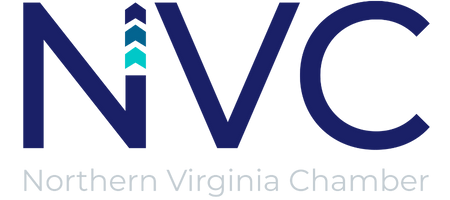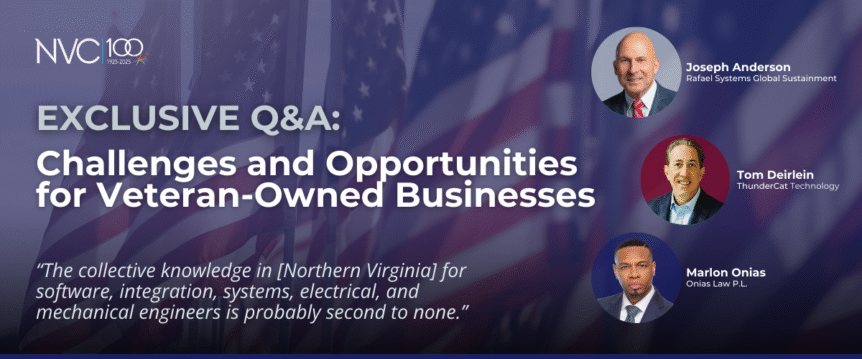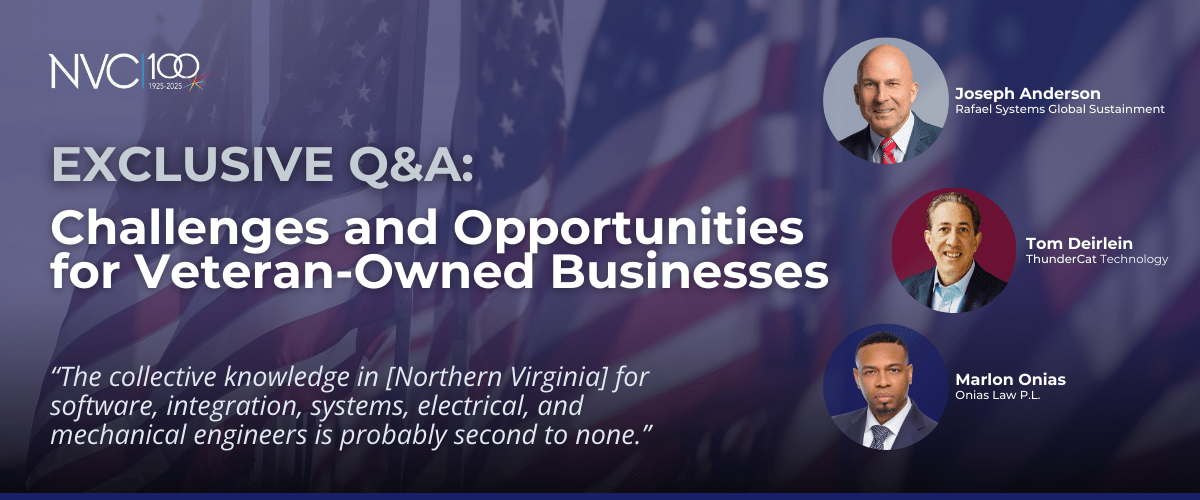Veterans bring mission focus, adaptability, and resilience into the business arena. These are the qualities that continue to shape Northern Virginia’s economy.
The region’s veteran-owned businesses reflect both entrepreneurial drive and a deep commitment to service, transforming military lessons into strategies that fuel growth and innovation. We’re proud to have celebrated them during our 2025 Distinguished Service Awards ceremony, hosted at the Army Navy Country Club on September 18, 2025.
As part of its centennial year, NVC is spotlighting industry leaders through special Q&A features that reach our broader membership. These conversations commemorate NVC’s diverse membership and elevate the voices of leaders shaping the region’s business landscape.
In this edition, we turn the spotlight to three veteran-owned business leaders: Joseph Anderson, President & CEO, Rafael Systems Global Sustainment (RSGS); Tom Deierlein, CEO, ThunderCat Technology; and Marlon Onias, Managing Member, Onias Law P.L. We explore how their military experiences inform their leadership, the challenges and opportunities facing veteran-owned businesses, and the risks and rewards of building businesses in a rapidly evolving marketplace.
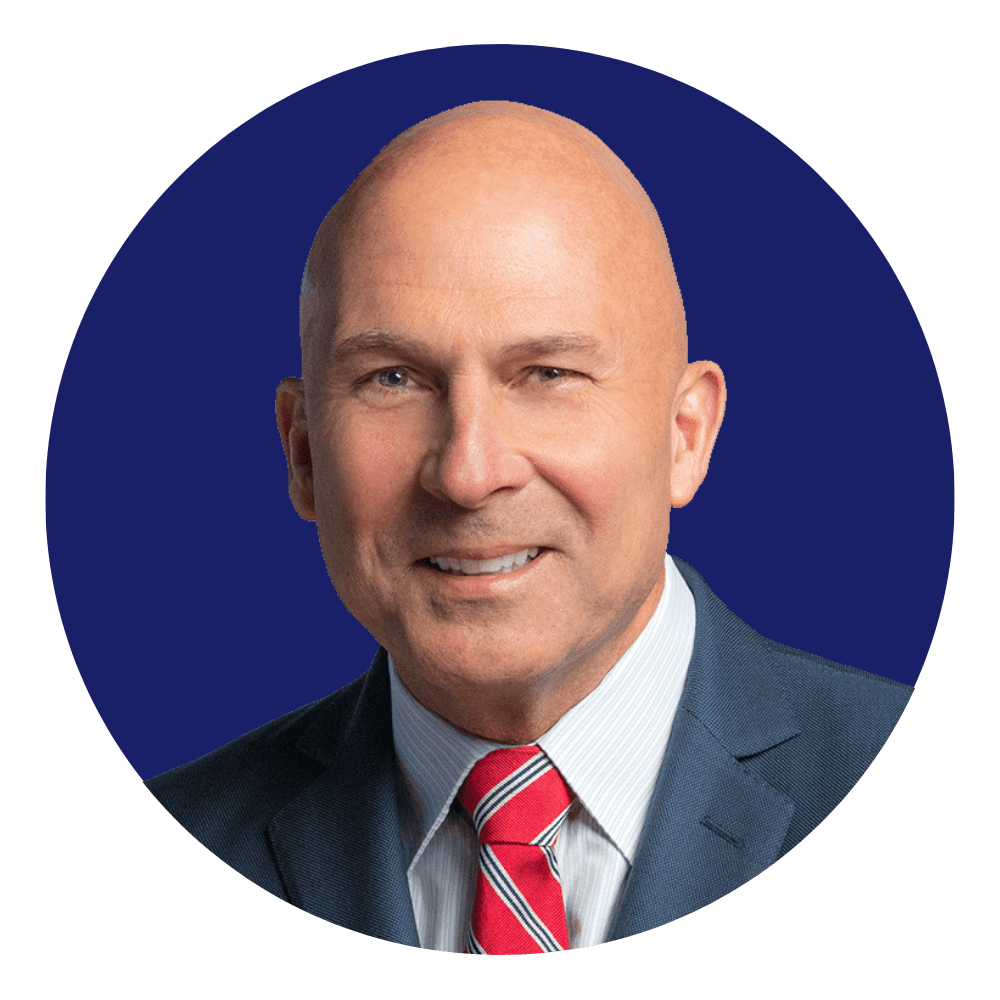 Joseph Anderson, President & CEO, Rafael Systems Global Sustainment (RSGS)
Joseph Anderson, President & CEO, Rafael Systems Global Sustainment (RSGS)
Describe your military service.
I served in the U.S. Army from 1981 to 2019, where I commanded Infantry units from company through-Corps level. I served in a mechanized unit at Fort Polk, Louisiana, and a light unit at Schofield Barracks, Hawaii. I commanded an airborne company in Fort Kobbe, Panama; an airborne battalion at Fort Bragg, Northern Carolina, where we deployed to Albania and Kosovo; and the XVIII Airborne Corps, where we deployed to Afghanistan. I commanded a Ranger Company at Fort Lewis, Washington, where we deployed to Panama for Operation Just Cause. I also commanded an Air Assault Brigade at Fort Campbell, Kentucky, where we deployed to Operation Iraqi Freedom 1. I served as the Chief of Staff of the 101st Airborne Division Chief of Staff at Fort Campbell, the III Corps Chief of Staff at Fort Hood, Texas, where we deployed as the Multinational Corps Iraq Headquarters in Baghdad, and the Multinational Force Iraq Chief of Staff as an individual augmentee. I served three tours in the Pentagon as a Colonel, Major General, and Lieutenant General.
How has your military experience shaped your approach to building high-performing teams and making critical decisions under pressure in a business setting?
My military experience taught me leadership and that it’s all about taking care of your people. That is no different in the business world. Your first task is to properly train and prepare your people for the tasks that they are expected to perform. No one should ever be put into a position without proper preparation. Then, you issue guidance and intent and expect your people to perform within those guidelines. You want to empower them to make decisions at the lowest level possible and encourage them to take the initiative and be proactive, versus reactive. All of us make mistakes – the key is how we learn from those mistakes and don’t make the same mistake twice. The last piece is to develop a professional development program, which includes employee feedback to ensure that they continue to learn and grow for positions with increased responsibility.
What is one industry norm or policy that continues to limit veteran-owned businesses, and what changes would have a meaningful impact?
Veteran-owned businesses continue to be limited by the industry culture that veterans are not as educated, experienced, or necessarily as reliable as the civilian workforce. Much of this is biased based on what executives and HR professionals see on the news on war-related injuries – both physical and mental. Oftentimes, this perception becomes reality in many employees’ minds. Change will be driven by veteran and military service organizations across the nation, as well as at the state and local levels. We need advocacy to dispel the myths about veteran-owned businesses and good use cases to demonstrate exactly how capable, reliable, and dependable these businesses are.
As Northern Virginia’s economy evolves, where do you see the greatest opportunities for veteran-owned companies?
I think the greatest opportunities in Northern Virginia continue to be in the artificial intelligence (AI) and information technology (IT) spaces. The collective knowledge in this area for software, integration, systems, electrical, and mechanical engineers is probably second to none. These are very competitive businesses and require top talent and the ability to compensate them for their skill sets. Veterans possess a lot of experience in these areas, and the potential synergy that can be built by entrepreneurs to be competitive in this market is huge. The challenge is having the resources to keep up with the internal research and development requirements to provide viable capabilities.
Can you share a business risk you took that delivered results, and what it taught you about leading through uncertainty?
A business risk that I took was trying to establish a services portfolio, primarily through engineering assets, while maintaining product business sales. Product sales were much more profitable but building a team to understand our technologies and be the face of the products was risky from a cost perspective. Over time, I realized taking that risk and making that investment was going to save one of our programs where we were relying on a business partner to be the lead with the U.S. Government. The program would have failed had we not done that. And, by doing that, it convinced our parent company that their investment in us was well worth it. Not just for that program, but for others as well.
What was the most unexpected challenge you faced when transitioning from military service to civilian business leadership, and how did you overcome it?
The biggest challenge was learning about the business world. I agreed to start a small American start-up proxy subsidiary company with no business experience whatsoever. I started the business from scratch as the sole employee in borrowed office space with a $1.5M investment from my parent company. I tackled my way forward just like I did in the Army. I found mentors and experts to rely on, did my homework, learned every day, and built a solid team around me. Most importantly, I learned by doing and now help many others do the same thing. We are now 17 people strong with a projected profit of $10M this year. Staying focused, establishing priorities, and taking time to think, as well as effective communication, are all important aspects of civilian business leadership.
 Tom Deierlein, CEO, ThunderCat Technology
Tom Deierlein, CEO, ThunderCat Technology
Describe your military service.
I graduated from West Point in 1989 and spent my first year at Ft. Benning, finishing the Airborne and Ranger courses as an Infantry Officer. Then, I went onto the Berlin Brigade from 1990-1993. I left Active Duty in 2005 and was in the Individual Ready Reserve (IRR). I then spent time at Ft. Bragg and deployed to Baghdad. Shot by a sniper in September 2006, I retired in May 2007.
How has your military experience shaped your approach to building high-performing teams and making critical decisions under pressure in a business setting?
First and foremost, I try to think about and stay true to the 11 Timeless Principles of Leadership I learned in 1985 that are still taught today.
Second, when building teams, I look for three things: values, commitment, and a range of skills. High-performing teams have shared values, and more important than experience is commitment to mission or goals. In terms of skills, the military uses combined arms – think Army, Navy, Air Force, Marines – they bring different skills and capabilities. As far as decision-making under pressure, we were always trained to survive and thrive in a VUCA environment: Volatile, Uncertain, Complex, and Ambiguous. “Adapt, improvise, and overcome” is a mantra you hear many veterans use. It is ingrained in us during training to enable us to focus and make decisions under pressure to do whatever it takes to accomplish the mission.
What is one industry norm or policy that continues to limit veteran-owned businesses, and what changes would have a meaningful impact?
I think the Veterans Affairs (VA) and now the Small Business Administration (SBA) understand how difficult it is to start a company without capital. I believe there are some changes afoot that will allow an early start-up to raise money and still qualify as a Veteran-Owned and controlled small business. Right now, you must have 51% and full decision-making authority. I believe those are critical criteria. But perhaps there is a method to have fundraising in the first couple of years that accounts for the fact that financial institutions may want some say in how their loan is spent. I believe they are already working on this.
As Northern Virginia’s economy evolves, where do you see the greatest opportunities for veteran-owned companies?
The biggest opportunities remain in the public sector. The ability to compete for small business set-asides in the federal government and for local and state business in Virginia has proven successful for us and many others. If you have a B2C business, I would network with other successful veterans in that business to learn and perhaps partner. I still think franchising opportunities have been a nice path too.
Can you share a business risk you took that delivered results, and what it taught you about leading through uncertainty?
During the COVID-19 pandemic, we signed a lease to double our office space. While others were cutting back or turning to 100% remote, we knew we wanted our team back together on a daily basis and needed to invest in a great space with amenities like a gym, a deli, fun spaces, and a quiet space, in addition to flex space and gathering spaces. While others struggled getting folks back to the office, we wanted them to be motivated, not dictated to return. It worked. What it taught me is that in times of uncertainty is when your team needs you to lead the most. They want a pragmatically positive attitude and for you to serve and lead others.
What was the most unexpected challenge you faced when transitioning from military service to civilian business leadership, and how did you overcome it?
When I first got out in 1993, I struggled as a civilian. The transition was lonely and difficult. I went from a leader to an individual contributor and wasn’t good at my job. I found myself back in my parents’ basement and in debt. NOT fun. I overcame it by changing jobs and pursuing further education, earning my MBA part-time at night and on weekends. Eventually, I found myself leading others again during the dotcom boom (and bust). Leadership challenges are quite the same for business, military, and any organization. I feel it breaks down into three major areas:
- Values and character: People want a leader they trust and who makes the right choices regardless of consequences.
- Concern for your people: Genuine concern and desire to help them be their absolute best personally and professionally.
- Decisions: Willingness to make decisions –including the hard ones — and be held accountable for them.
Technically, there is a fourth: Results. Without success, the other three don’t matter.
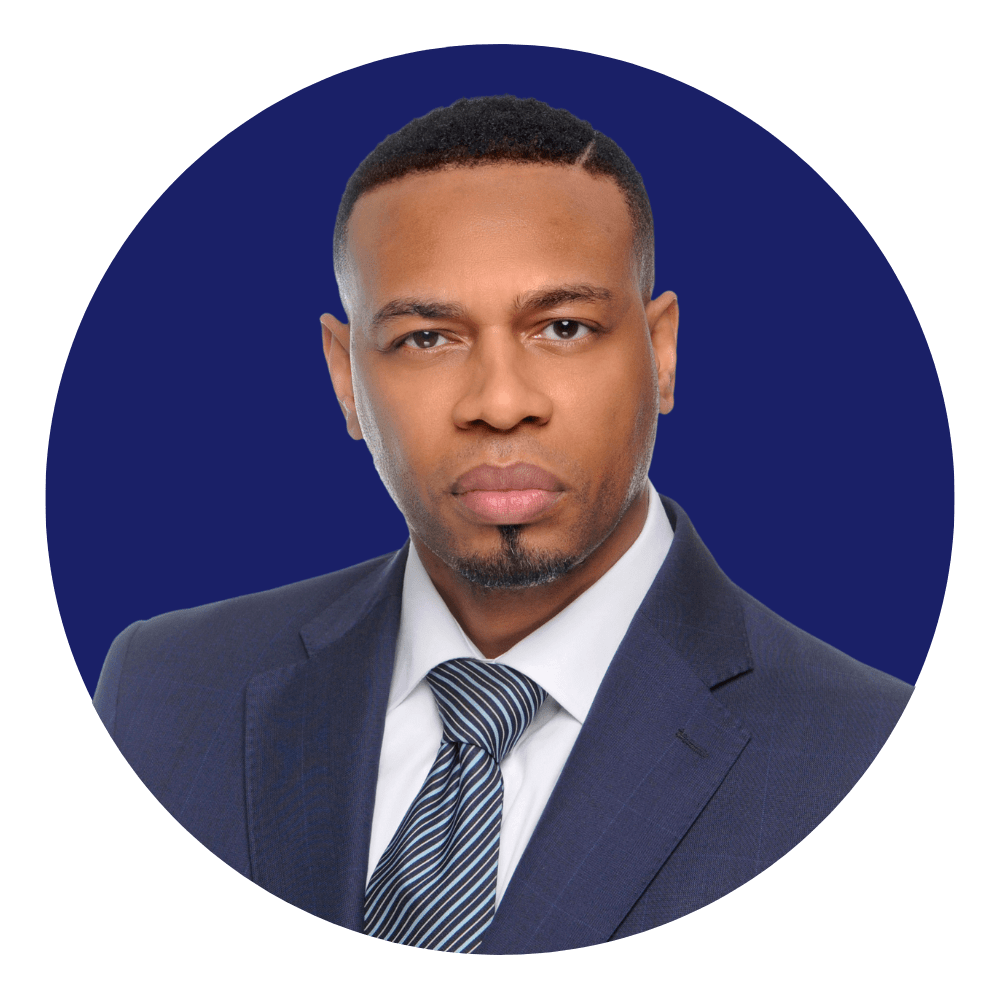 Marlon Onias, Managing Member, Onias Law P.L.
Marlon Onias, Managing Member, Onias Law P.L.
Describe your military service.
I had the honor of serving in the U.S. Coast Guard from 1997 – 2001.
How has your military experience shaped your approach to building high-performing teams and making critical decisions under pressure in a business setting?
It has allowed me to understand; excellence just does not happen, it is cultivated and prepared for, and neither does change just happen, it is implemented.
What is one industry norm or policy that continues to limit veteran-owned businesses, and what changes would have a meaningful impact?
Access to true capital at a fair interest rate. A lot of veterans are not coming from a place of great assets, but have these great ideas and drive, but lack the financial partnership needed to allow their dreams to come to fruition.
As Northern Virginia’s economy evolves, where do you see the greatest opportunities for veteran-owned companies?
I see major opportunities in the global tech market, especially in private and international government sectors. As Northern Virginia shifts from a predominantly federal government-contracting focus, veteran-owned companies will take a more international outlook to meet rising global tech demands.
Can you share a business risk you took that delivered results, and what it taught you about leading through uncertainty?
While serving as a police officer in Newport News, I started a medical waste company and eventually left law enforcement to pursue it full-time. The leap was daunting, but it taught me the value of calculated risk and moving quickly. Even though I left too soon, the lessons were invaluable.
What was the most unexpected challenge you faced when transitioning from military service to civilian business leadership, and how did you overcome it?
The most unexpected challenge was the lack of camaraderie compared to the Coast Guard. In the military, connectedness was strong and constant, while in civilian life, it was often missing. I overcame it by intentionally building supportive networks in business.
